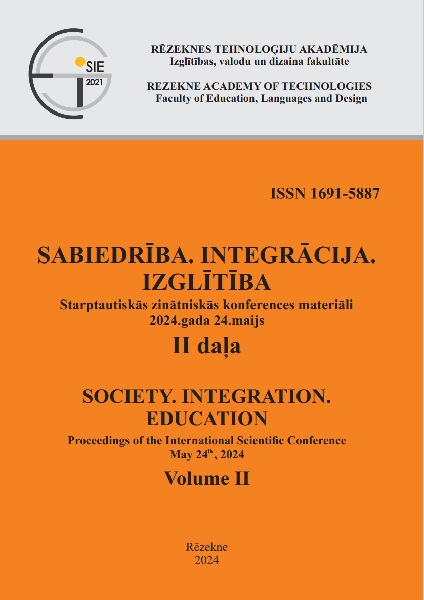THINKING STYLES INVENTORY ADAPTATION AND STANDARDIZATION IN LATVIAN
DOI:
https://doi.org/10.17770/sie2024vol2.7892Keywords:
questionnaire adaptation, questionnaire standardization, stages of youth development, thinking stylesAbstract
Thinking styles are defined as consistent individual differences in preferred ways of organizing and processing information and experience, thus bridging the gap between personality traits and cognitive processes, meaning, it is more important to understand what abilities people prefer to develop and use, rather than what abilities they have. Thinking styles remain an ongoing area of research in education and psychology, providing insights into students’ experiences and informing educational practices. Latvia still faces a shortage of validated and standardized tests, thus to determine thinking styles, a questionnaire titled “Thinking Style Inventory – Revised II” was selected. This research is a part of a much wider study, which is based on the idea that nowadays the use of the internet and technology form and develop young people’s habits of mind that have not yet been explored. Based on this idea, a research project was established whose overall goal is to discover the impact of young people’s (age 16-25) internet use patterns on cognitive functioning (The impact of internet usage patterns on the development of youth’s cognitive styles, No.: lzp-2021/1-0357). The goal of the specific stage of the study and thus this article is to adapt and standardize the Thinking Style Inventory–Revised II in Latvian. To reach the goal, the questionnaire underwent back and forth translation, then was piloted (n=30), checked for internal consistency, thus concluding the first stage of adaptation. For standardization (n=2169) factoranalysis, discrimination indexes and norms were determined. The results show an overall good internal consistency and the factoranalysis shows similar structure to the original questionnaire. The obtained results indicate that Thinking Style Inventory – Revised II Latvian version can be successfully used to determine thinking styles in Latvia.
References
Arnett, J., Kloep, M., Hendry, L. B., & Tanner, J. L. (2010). Debating Emerging Adulthood: Stage or Process? Oxford: Oxford University Press.
Berding, F., Masemann, M., Rebmann, K., & Paechter, M. (2016). Perspectives on the Validity of the Thinking Styles Inventories. World Journal of Education, 6(6), 69-82.
Cascio, W., & Montealegre, R. (2016). How Technology Is Changing Work and Organizations. Annual Review of Organizational Psychology and Organizational Behavior, 3, 349-375.
Hartnett, M., Brown, M., & Anderson, B. (2014). Learning in the Digital Age: How are the Ways in which We Learn Changing with the Use of Technologies? In: A. St. George, S. Brown, J. O’Neill (Eds.), Facing the Big Questions in Teaching: Purpose, Power and Learning (116-125). Cengage Learning
Hendry, L., & Kloep, M. (2015). Young People, Technology and Change. Understanding the System? Metamorfosis, 2, 50-66.
Liepa, D., & Polinska, V. (2022). Vieglā valoda. Rokasgrāmata. LU Akadēmiskais apgāds.
Messick, S. (1984). The Nature of Cognitive Styles: Problems and Promises in Educational Research. Educational Psychologist, 19, 59-74.
Perepjolkina, V. (2014). Daudzdimensionālas personības aptaujas izstrāde un validizācija Latvijas pieaugušo izlasē. Available at: https://dspace.lu.lv/dspace/bitstream/handle/7/4921/40321- Viktorija_Perepjolkina_2014.pdf?sequence=1
Romera, D. D. (2018). Sternberg-Wagner Thinking Styles: a Research Tool in Social Science Didactics. Journal of Technology and Science Education, 8, 398-407.
Røpke, I. (2001). New Technology in Everyday Life – Social Processes and Environmental Impact. Ecological Economics, 38(3), 403-422.
Sternberg, R. J. (1997). Thinking Styles. Cambridge University Press.
Sternberg, R. J., & Grigorenko, E. L. (1997). Are Cognitive Styles still in Style? American Psychologist, 52(7), 700-712.
Sternberg, R. J., & Zhang, L.-F. (2006). The Nature of Intellectual Styles. Lawrence Erlbaum Associates Publishers.
Sternberg, R. J., & Zhang, L.-F. (2009). Perspectives on the Nature of Intellectual Styles. Springer Publishing Company.
Sternberg, R. J., Wagner, R. K., & Zhang, L. F. (2007). Thinking Styles Inventory – Revised II (Unpublished test). Tufts University.
Tully, C. J. (2003). Growing Up in Technological Worlds: How Modern Technologies Shape the Everyday Lives of Young People. Bulletin of Science, Technology & Society, 23(6), 444-456.
Zhang, L.-F. (2002). Thinking Styles and Modes of Thinking: Implications for Education and Research. The Journal of Psychology, 136, 245-261.
Zhang, L.-F. (2003). Contributions of Thinking Styles to Critical Thinking Dispositions. The Journal of Psychology, 137(6), 517-544.






